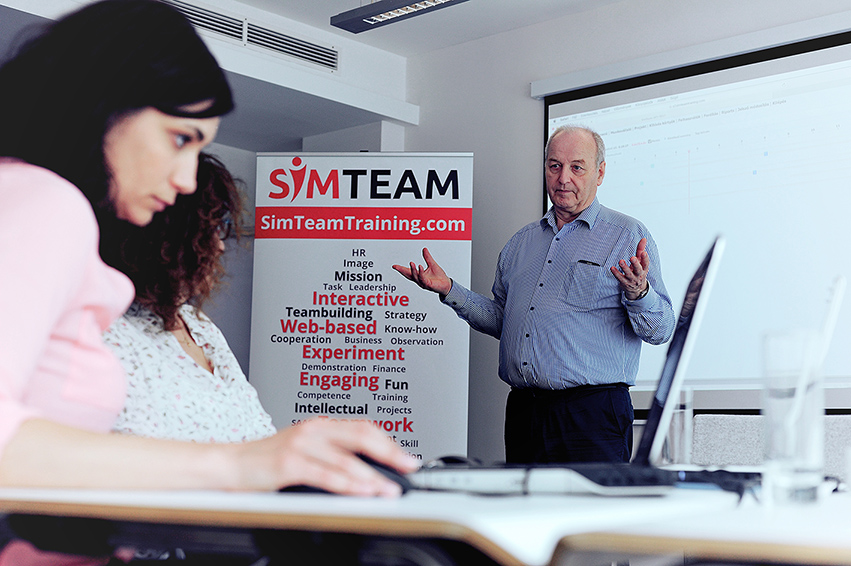Start-up education courses with Online Business Simulation
“ A start-up is a human institution designed to create something new under conditions of extreme uncertainty.” (Eric Ries)
Education during the start-up incubation process
A crucial element of the start-up incubation process is the comprehensive business training provided for the start-up personnel. During this activity participants can familiarise the key management concepts and tools that will be fundamental for their company’s success.
Entrepreneurship
The ever-changing economy requires that management must be flexible, adaptable, speedy, innovative and to have an aggressive competitive spirit. In this competitive economic environment the major goal is to discover, obtain and sustain a competitive advantage. An entrepreneurial mind set is a vital requirement for business success in newly established enterprises.

Corporate entrepreneurship (Shaker A. Zahra) is a set of activities designed to enhance a company’s ability to innovate, take risks, and seize the opportunities that are arising in the market. Corporate entrepreneurship is targeted on new business establishment, opening to new markets or both. Corporate entrepreneurship comes from a combination of the entrepreneurial activities of multiple participants (Robert A. Burgelman).
External entrepreneurship is a line of entrepreneurial activities that combine resources that are dispersed in the environment with resources that are held by the company to create a new unique coalition to achieve financial profit. Internal entrepreneurship is realized in the ability to craft new combinations of the company’s existing internal resources (Michael G. Brizek).
The SimTeam simulation platform suits perfectly the curriculum of entrepreneurship courses with startup focus. Participants practice teamwork, face competition and learn various techniques that will be necessary for the improvement of their skills.
Course objectives / Learning objectives
- Create situations where participants can understand and practice the principles of entrepreneurship.
- Participants face changing environments where their enterprise continuously faces competition. They should work out innovative answers to the challenges, evaluate the risks and co-operate with teammates.
- As they face complex decisions, participants can learn to see the bigger picture, which needs the cooperation and input of every functional area of the company.
- During the simulation participants will be forced to think and make decisions in the long run, but they also need to balance the short term and long-term goals of the company.
Topics covered
- Establishment and development of a start-up enterprise in an ever-changing external environment.
- Practice decision making.
- Awareness of decisions’ financial consequences.
- Financial planning.
- Analysis of financial results.
- Development long-term competitive advantage on the market.
- Recognition of opportunities.
- Hiring the right team.
- Resource allocation among projects.
- Funding of growth.
- Corporate valuation.
Participant Learning Outcomes
During the course the participants will:
- Act in an environment where an innovative approach can be the core element of their team’s success.
- Learn how to evaluate the market environment and how to adapt to it.
- Understand risk evaluation and practice taking risks.
- Experience the financial consequences of their decisions.
- Practice teamwork.
- Understand the importance of strategic thinking.
- Practice autonomous strategic behaviour.
- Improve their alertness to opportunities.
- Understand the valuation of their enterprise.
Who should attend?
- Start-up professionals and employees of start-ups.
- Participants of start-up incubation programs and start-up acceleration programs.
- Business schools and university students who attend management courses where start-up entrepreneurship is a focus topic.
Suggested training outline
1) Single course
The following structure is suggested during the course:
- Introduction to the concept of corporate entrepreneurship (1-2 hours)
- Introduction of the learning environment; explaining the rules of the simulation - (0,5 - 1 hour)
- Establishing the targets for the teams - (0,25 hour)
- A SimTeam simulation where participants can practice the core focus areas while experiencing market changes and competition among companies (4-6 hours)
- Focused topical related exercises (during the simulation period): setting strategic goals for a company, assessing market events and adapting the strategy to possible market changes and competitors’ actions
- Evaluation and feedback - (0,5 - 1 hour)
Total time requirement: 1-1,5 days
2) Multiple session course
The course can also be organised in multiple sessions. In this case each session can be 1,5 - 3 hours. There are two types of format:
a. Every occasion starts with a knowledge transfer session after which the participants use the SimTeam environment for running a short case study exercise (i.e. the simulation sessions are not linked)
b. Every occasion starts with a knowledge transfer session after which the participants use the SimTeam environment for running a short case study exercise (i.e. the simulation sessions are not linked)








